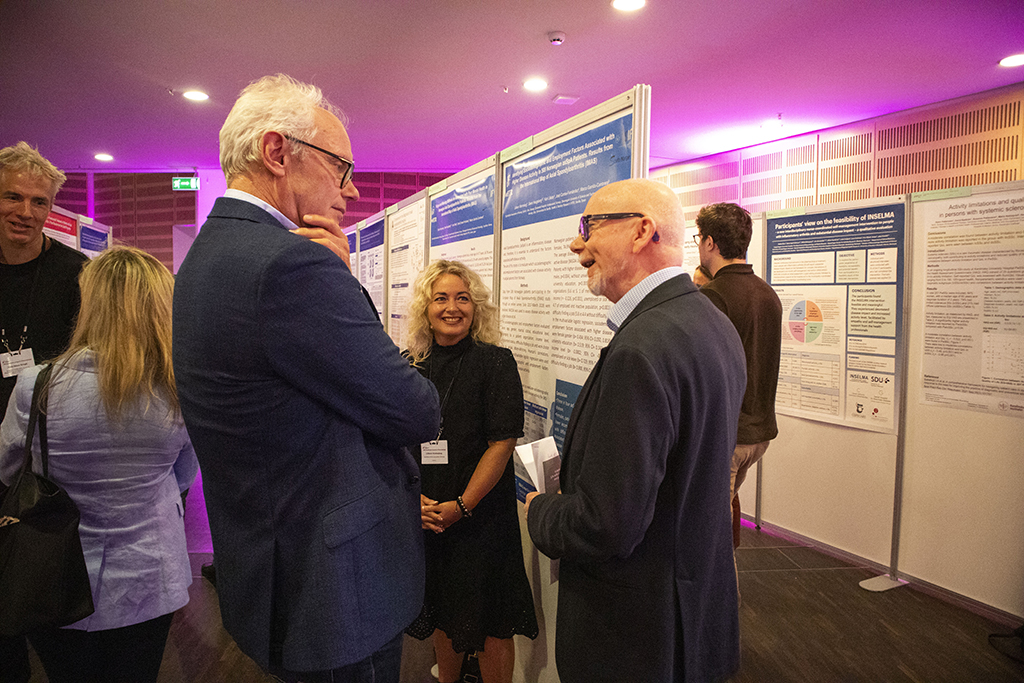
Spafo Norway attended the Scandinavian Rheumatology Conference (SCR 2023) in Copenhagen in August.
While there, they raised awareness of the challenges facing people living with axSpA, with rheumatologist, health care professionals and researchers.

Spafo Norway attended the Scandinavian Rheumatology Conference (SCR 2023) in Copenhagen in August.
While there, they raised awareness of the challenges facing people living with axSpA, with rheumatologist, health care professionals and researchers.
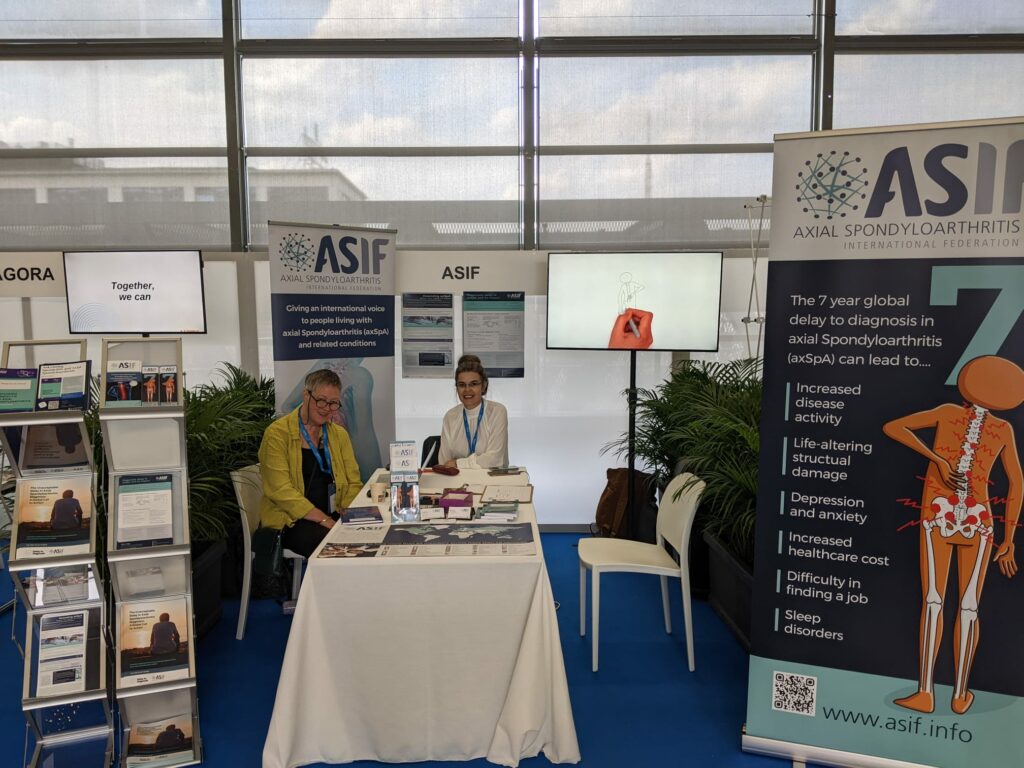

ASIF booth at EULAR 2023 in Milan, Italy
Rheumatologists from Aruba to Argentina, Pakistan to Panama and so many countries in between spoke to the ASIF team about our work and the impact Patient Organisations make to the lives of people living with axSpA.
During EULAR, some of the world’s leading researchers and rheumatologists discussed the importance of patient centric research and care. We explored our priorities with our industry partners and how, by strengthening our relationships, we can develop projects that our members can use to change lives.
We will share a report on EULAR soon.
AiArthritis’ Go With Us to EULAR 2023 Live Debrief
Saturday, Jun 17, 2023 on Facebook at 12:00 pm EST / 9:00 am PST (USA).
Click here to attend the debrief live or find out how to watch it on demand.

The National Axial Spondyloarthritis Society (NASS) in the United Kingdom recently launched Your SpAce, which has been created in partnership with people living with axSpA and healthcare professionals.
Your SpAce allows people living with axSpA to engage with their condition, learn more about axSpA, and build skills to manage the impact it has on their life.
The programme is free to access on the NASS website and YouTube channel. It includes co-produced, short informative videos on topics such as pain, fatigue and flares. There are downloadable resources in each topic, so people living with axSpA can create their own personalised toolkit.
Your SpAce provides a community for people who are at the start of their axSpA journey or who are struggling and feeling isolated. Building a supportive community through monthly online meetups, which provide a relaxed way to connect with others living with axSpA, share ideas and get support. Embedded in the topics are videos of people with axSpA sharing their experiences.
Find out more about the programme at nass.co.uk/about-as/your-space
Would your organisation like to be featured in the next newsletter? Please email Jo de Bry at communicationsmanager@asif.org to find out more.
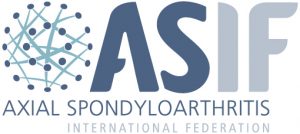
Michael Mallinson attended the American College of Rheumatology (ACR) Convergence Meeting in San Diego in November 2022. He has provided a series of comprehensive reports on key sessions.
Thank you, Michael for your commitment to sharing information for the benefit of people living with axSpA.
Click on the reports to read them:
ASAS-EULAR Recommendations for the Management of Axial Spondyloarthritis: 2022 update
For an Exploratory Analysis of the Potential Disconnect between Objective Inflammatory Response and Clinical Response following Certolizumab Pegol Treatment in Patients with Active Axial Spondyloarthritis, read here.
Bimekizumab Improves Signs and Symptoms, including Inflammation, in Patients with Active Non-Radiographic Axial Spondyloarthritis: 24 Weeks Efficacy and Safety from a Phase 3 Multicentre, Randomized, Placebo-Controlled Study, read here.
Continuing (Full or Reduced Treatment) versus Withdrawing from Golimumab in patients with non-radiographic axial spondyloarthritis who Achieved Inactive Disease: Efficacy and Safety Results from a Placebo-controlled, Randomized Withdrawal and Retreatment Study (GO BACK), read here.
Comparison of the Effect of Treatment with NSAIDs added to Anti-TNF therapy versus Anti-TNF therapy alone on Progression of Structural Damage in the Spine over Two Years in patients with Ankylosing Spondylitis: an Open-Label Randomised, Controlled, Multicentre trial (CONSUL), read here.
Profiling of Systemic Immune Responses in Axial Spondyloarthritis Patients reveals Strikingly Distinct Cellular and Molecular Mechanisms of Action of IL-17A Inhibitors and TNF Blockers, read here.
For Action Council Pathway, read here.
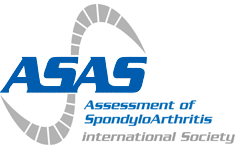
At the end of 2022, ASAS (Assessment of Spondyloarthritis International Society) and ASIF signed a Memorandum of Understanding (MOU) to put our relationship on a more formal footing.
This MOU means that both organisations will aim to keep each other informed of key plans agree to identify opportunities for collaboration and will contribute expertise and experience towards mutually agreed objectives.
The Trustees of ASIF were delighted to be invited to send two representatives to attend the ASAS 2023 Annual Meeting which took place in Athens in January. Andri Phoka, Secretary, ASIF and Jo Davies, Assistant Director, ASIF joined the meeting.
We are especially thankful to Xenofon Baraliakos, President of ASAS and to the rest of the Executive Committee for making us so welcome. During the meeting, ASAS educational activities and research projects were presented and discussed. This report covers just a few highlights from the ASAS 2023 Annual Meeting.
Author Maranda van Dam- ASIF Trustee, Chairperson ASASA South Africa
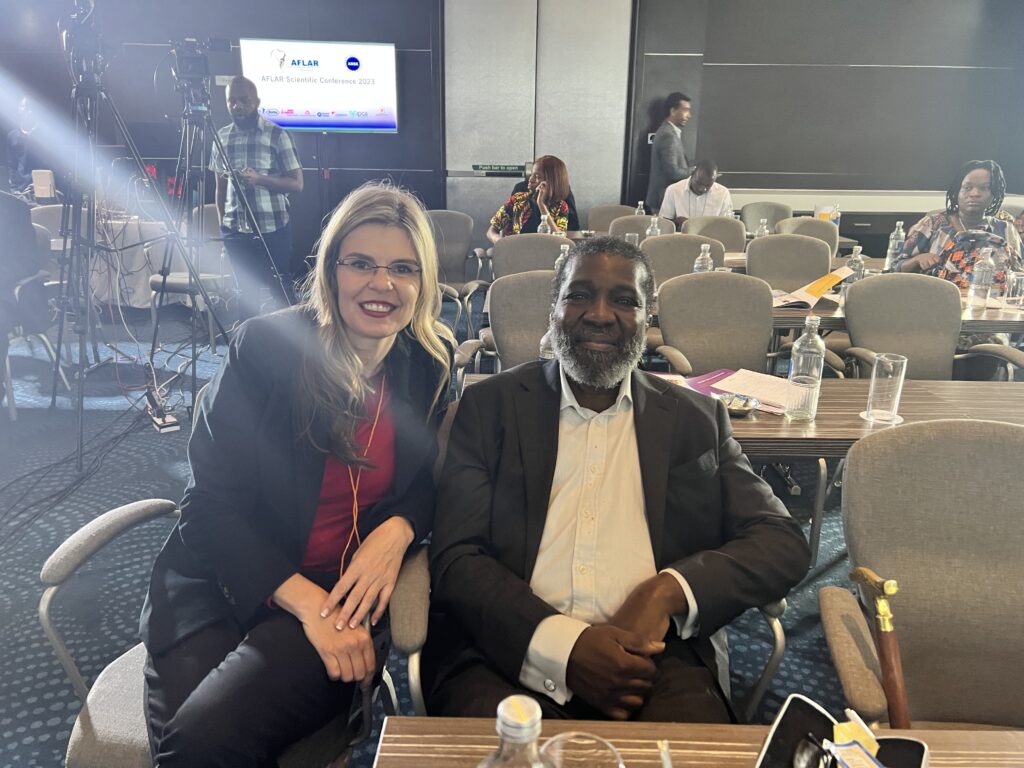
There is a massive lack of rheumatologists in Africa. According to a study done by the ACR in 2015, the ideal ration would be 2:100 000.
Africa currently has 150 rheumatologists serving a population of 1.25 billion, which is a mere 0.012:100 000. The majority of the rheumatologists (85) are in South Africa (60 million population) with the remaining 65 serving 1,240 billion people.
A roadmap must be created to increase the number of rheumatologists and enable more equitable access to healthcare across Africa.
Maranda van Dam and Prof. Olyfemi Olafipp Adelowo
In contrast to earlier reports, rheumatological conditions are now not considered to be rare in Africa and several articles reflect this. With globalisation on the increase, we are seeing migrants from Sub-Saharan Africa, living in the West, where they receive good attention and care.
The African League of Association (AFLAR) represents all 54 countries in Africa; and on 22 February I travelled to Nairobi, Kenya to attend its conference.
__________
The first day was spent doing clinical training at the AGA Khan University Centre, where topics included examination of the upper limbs, lower limbs and spine. The joint injection workshop was also highly rated by the scholars.
The keynote speaker at the AFLAR Conference was Prof Anthony Woolf, handling an important topic of the Global Burden of RMSs, and how the global rheumatology community should respond.
Herewith his key messages: Musculoskeletal health is central to wellbeing and healthy independent lives. Musculoskeletal disorders are common in all countries and cultures. In fact, the impact across Africa is much larger than previously thought.
This major cause of disability places a significant burden on health and social care. There are effective ways of preventing and controlling musculoskeletal conditions but these are not implemented with equity. There is a lack of policies and priorities for musculoskeletal conditions and investments in prevention, treatment, education and research.
Prof. Woolfs’ key recommendations were to educate and engage communities and governments, integrate MSK health into policies, build capacity, sustainable financing and surveillance. The importance of the strategic work at the WHO regarding MSK diseases could not be understated.
__________
Over the next two days we listened to revealing abstracts out of different parts of Africa, and herewith some highlights:
Nairobi, Kenya – a call was made for urgent registries for understanding the burden and impact of MSK and autoimmune diseases in Africa and improving the diagnosis, treatment and management of these diseases.
East Africa – a total of 1089 community consultations in Zambia and Kenya were completed and a total of 271 people reported with MSK issues. Only 3% represented inflammatory joint disease.
Nigeria– a total of 127 SpA patients were seen over a 12 year period, with 81% having AS. This demonstrates the prevalence of axSpA in North West Nigeria. HLA-B27 was prevalent, as was a significant delay to diagnosis.
Dakar, Senegal – 23 cases were found associated with this disease of which 76% were females. The HLA-B27 gene was found in 52% of the cases.
The key takeaways from AFLAR were:
__________
Unlike South Africa and Algeria, patient support networks for axSpA are a foreign concept in the rest of Africa. I only found one other patient group that attended the conference (they support people with SLE). This was a topic of much discussion during AFLAR, the birth of patient support and advocacy across Africa and in all the continents that have rheumatologists. Africa not only has a shortage of specialist care for our RMD patients, but patient support is extremely uncommon.
The paucity of epidemiological data is partly driven by the low number of practicing rheumatologists in Africa.
Parts of Africa have widespread infectious diseases like HIV and hepatitis and regular breakouts of cholera, malaria and measles. Resources and medical care are funnelled to take care of these patients, RMD resources being much less prioritised.
The role of the traditional healer plays a massive role in the delay to diagnosis of a lot of patients; in South Africa 80% of the population seek health care from traditional healers and many people seek health care from both traditional and western medicine.
It is essential to invest in the development and maintenance of accurate patient registries across Africa to address the high burden of musculoskeletal and autoimmune diseases on this continent. Registries can also monitor the quality of care for patients with MSK diseases.
The importance of patient support is lost in most parts of Africa. Education, especially with a focus on West, East and North Africa, needs to be the focus over the next 5 years. It should have a special focus on the role a patient support network can have on already overburdened specialists.
During the AFLAR Conference, I presented two abstracts, on behalf of ASIF and the Axial Spondyloarthritis Association of South Africa (ASASA). I spoke about Delay in Diagnosis Spondyloarthritis, in South Africa and Understanding Mental Health in patients with Axspa. The abstracts were received with much enthusiasm and many questions. Hearing from a patient group was indeed a foreign occurrence for most in the room.
As a new dawn breaks in Africa for rheumatological diseases, a massive need for patient advocacy and support groups will grow exponentially. The lower income countries rely heavily of Western countries for support and education, which makes this hopeless situation seem less so. Most of the African countries now require their specialists to qualify with the EULAR educational course, which sets the bar for the training very high.
There is no doubt that the growing number of RMD patients across Africa will create a massive burden on patient care and support systems. The role of patient support is a crucial element of a normal health system. The needs of a RMD patient are often much more than a clinical appointment. In the foreseeable future Africa will face the challenge of offering patient support to already impoverished countries.
As one of our colleagues said during the conference: ”If you do not think that you will make a difference, no matter how small you are, you have clearly not been in a room with a mosquito”.
REFERENCES:
Ibrahim DA, Na’Isa MBK, Hamidu A, Profile of Spondyloarthropathy patients in Kano, Northwestern Nigeria, African Journal of Rheumatology Volume 11, January 2023m ISSN 2307-2482
Charifah S, Niasse M, Gueye YA, Diallo S, Spondyloarthritis and autoimmune diseases: preliminary study of 23 Senegal Cases
Genga EK, Call for Action: development of patient registries in Africa
The current outlook of rheumatological care in Africa: Current State, challenges and recommendation. Annals Med Surg 2022;82 https://doi.org/10.1016/j.amsu.2022.104689
Yao Boum, Sylvie Kwedi-Nola, Jessica E Haverer, Rise R G Leke, Traditional healers to improve access to quality health care in Africa.
Written by Dr. Muhammad Asim Khan
It was with great sadness that we learned of the passing of Prof. Dr. Ernst Feldtkeller at 92 years of age (October 19, 1931 — January 4, 2023). He was truly a remarkable and inspiring person, scientist, and researcher, with a PhD in Physics. He was appointed Professor at the Universities of Stüttgart and Munich, and a researcher at the Siemens Research Laboratories in Munich. He had suffered all his adult life from ankylosing spondylitis (frequently called Morbus Bechterew in German-speaking countries), and in 1980 he played a pivotal role in the formation and subsequent management of the German Ankylosing Spondylitis Society named Deutsche Vereinigung Morbus Bechterew (DVMB).
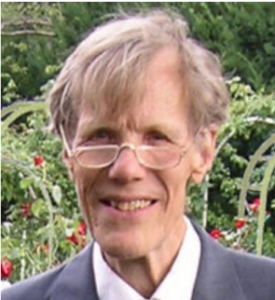
He authored an excellent book in German on ankylosing spondylitis for educating patients and their families and was the Scientific Director of the editorial office of the DVMB membership journal called Bechterew Brief. He was fluent in English, and he used to translate important English publications into German for the readers of his Journal. He selflessly put all his creativity, knowledge, and skills into the service of the DVMB and other organisations over the last 42 years.
On 8 April 1988, Ernst became a member of a committee that was formed, at the invitation of Fergus Rogers (of National Ankylosing Spondylitis Society, U.K.), to carry out the preliminary preparations necessary for the foundation of an International Ankylosing Spondylitis Association (which later became Axial Spondyloarthritis International Federation – ASIF). He was invited to attend the first ASIF Council Meeting in Leukerbad, Switzerland in July 1989, hosted by another remarkable patient and scientist Dr. Heinz Baumberger, PhD [1]. He was elected as a Vice-President of ASIF in 1992, a position he held until 2009. Thereafter, he served as ASIF’s Scientific Adviser until retiring from this role in 2017.
After his retirement from Professorship in 1992, Ernst devoted his full attention to doing scientific studies and clinical research in ankylosing spondylitis. In 1996 he obtained financial support from the German Federal Health Ministry and initiated a professional survey among the more than 14,000 patient members of SVMB. 1614 patients responded to this survey, and extended reports of the results were published in five issues of Bechterew Brief in 1997-1998. He then presented these results in English at the 1st International Congress on Spondyloarthropathies, in September 1998 in Gent, Belgium. Over the years Ernst had published many highly cited articles in German and English, and based on his extensive contributions, he was awarded membership of the Assessment of SpondyloAarthritis international Society (ASAS).
Ken Mulholland (ASIF Secretary 2002-2011) recalls meeting Ernst at the first ASIF Council Meeting; “My early impression of Ernst was his extensive knowledge of the disease, his research, and his extensive publications. Over the years, I got to know Ernst little more and see how instrumental he was in introducing Ankylosing Spondylitis to the world through his development of the ASIF website. Ernst was very meticulous in all his workings.”
I first met Ernst at the first ASIF Council Meeting in Leukerbad in 1989 and we became lifelong friends and co-authored two of his many highly cited publications [2, 3]. I frequently exchanged with him articles of interest and helped maintain Ernst’s remarkable personal library of articles from medical journals stored either digitally in a PDF format or, in some cases, as printed documents. He shared his personal library with me, and I sincerely hope that it will be kept alive and up to date.

Ernst’s other interests extended to mountaineering, cycling, playing the flute, and painting beautiful watercolour landscapes (pictured), many of which he generously gave away to friends and colleagues. He was also an avid photographer, always carrying his camera with him, and he regularly summarised important scientific meetings along with pictures of scientific presenters.
With Prof. Dr. Ernst Feldtkeller we have lost a valued companion, a respected fellow patient, and a good-hearted and charismatic personality. His unparalleled commitment, diligence, frugality, and modesty were an example to us all.
With his exemplary commitment to those affected, Ernst Feldtkeller earned a high and lasting reputation in the global spondyloarthritis community. Ernst’s contributions to DVMB and ASIF, and to the rheumatology and patient communities at large, will be sorely missed.
REFERENCES:
Khan MA., Accomplishments of Heinz Baumberger PhD: A remarkable patient with ankylosing spondylitis for 72 years, Clin Rheumatol. 2016 Jun;35(6):1637-1641. doi: 10.1007/s10067-016-3259-0.
Feldtkeller E, Bruckel J, Khan, MA., Scientific contributions of ankylosing spondylitis patient advocacy groups. Current Opin Rheumatol. 2002 Jul;12(4):239-247. doi: 10.1097/00002281-200007000-00002.
Feldtkeller E, Khan MA, van der Heijde D, van der Linden S, Braun J., Age at disease onset and diagnosis delay in HLA-B27 negative vs. positive patients with ankylosing spondylitis, Rheumatol Int. 2003 Mar;23(2):61-66. doi: 10.1007/s00296-002-0237-4.